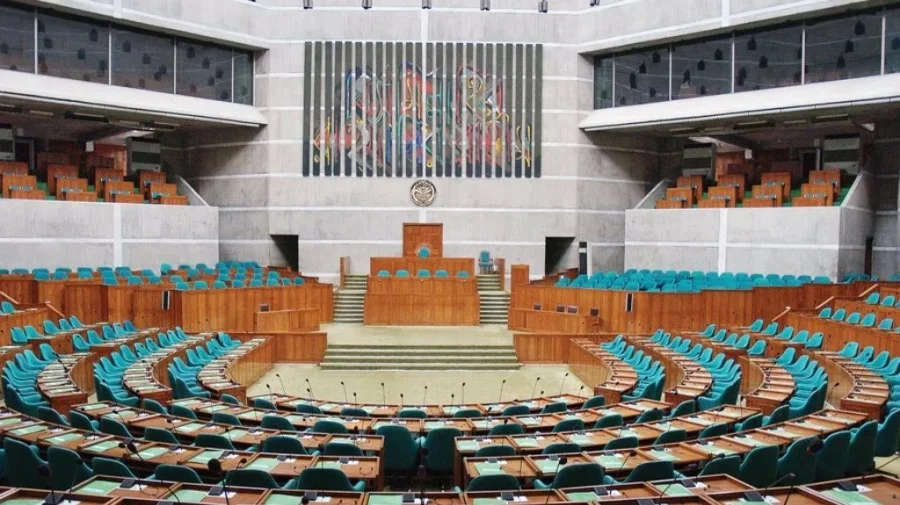Major laws passed by the Bangladesh Parliament in 2023
Share on:

Cyber Security Act, Universal Pension Management Act, among the most discussed
The past year was particularly remarkable for the Bangladesh Parliament in terms of enacting new laws and making significant amendments to existing laws.
In 2023, the Parliament enacted a total of 66 Acts and Amendment Acts.
Some of the most significant Acts and Amendment Acts are discussed below.
Universal Pension Management Act, 2023
The Act aims to bring all Bangladeshi citizens aged above 18 under the universal pension scheme.
Income Tax Act, 2023
The Income Tax Act, 2023 repeals the long-standing Income Tax Ordinance, 1984 introducing new provisions on Income Tax, Advance Income Tax, Tax Deducted at Source, Minimum Tax, Surcharges, and so on.
Bank Company (Amendment) Act, 2023
The Amendment Act brings in new provisions including defining willful loan defaulters, a “controlled company” and putting new limits on the tenure of bank directors.
Cyber Security Act, 2023
The Act replaces the Digital Security Act, 2018. It entails a maximum fine of Tk25 lakh replacing imprisonment for publishing defamatory news. The Act also reduces the penalty to a maximum of two years for the charge of inciting or hurting religious sentiments and makes the aforesaid offence bailable.
State Acquisition and Tenancy (Amendment) Act, 2023
The Amendment Act creates provisions for a Land Survey Appellate Tribunal to hear appeals from previously existing Land Survey Tribunals.
Family Courts Act, 2023
The Act repeals the long-standing Family Courts Ordinance, 1985 and, among other things, establishes family appellate courts consisting of one district judge in each court to hear appeals from family courts.
Bangladesh Public Procurement Authority Act, 2023
The Act is enacted to transform the Central Procurement Technical Unit (CPTU) into the Public Procurement Authority for increased professionalism and efficiency in public procurement. The Public Procurement Authority would regulate government purchase processes, ensure that all government procurement laws are followed, and be responsible for inspections, adjustment, management and supervision of procurement processes.
Copyright Act, 2023
The Act repeals the Copyright Act, 2000 and includes new definitions for anonymous or pseudonymous work owner, database, public domain, monogram, producer, person, folk song, folk culture, editor, and property rights. The Act provides increased penalties for copyright infringement.
Secured Transactions (Movable Properties) Act, 2023
This new law was enacted to make provisions for granting and receiving loans secured by movable property as collateral and for providing protection through the registration of such collaterals in the transactions of lenders and borrowers.
Patent Act 2023
The Act repeals the Patent Act 2022. The new Act shifts administrative power from the Office of the Registrar to the Director General of the Department of Patents, Industrial Designs, and Trademarks. It further establishes a clear court structure, with district courts handling patent cases and the provision for appeals to the High Court Division, providing a systematic approach to handling disputes to patents.
Customs Act, 2023
The Act replaces the Customs Act, 1969 with the goal of making up-to-date provisions on revenue collection, expansion of import and export trade, and facilitation of business. and expansion of new industrial sectors. Among other things, the new Act recognizes daily exchange rates of foreign currencies, or floating rates, ensuring transparency in customs assessments and transactions. The new law imposes a 10-percent penal tax in case of delays in releasing goods from the ports that often create congestion in the ports.
Finance Companies Act, 2023
The Act repeals the existing Financial Institutions Act, 1993. The new law introduces new measures to strengthen the governance of non-bank financial institutions (NBFIs). The new law defines wilful defaulters, prohibits individuals or family members from owning more than 15% of the shares of an NBFI and limits the number of directors from the same family to two.
Compiled by Saqeb Mahbub, Partner, and Zareef Muhammad Zubair, Associate, Mahbub & Company, a leading law firm.

